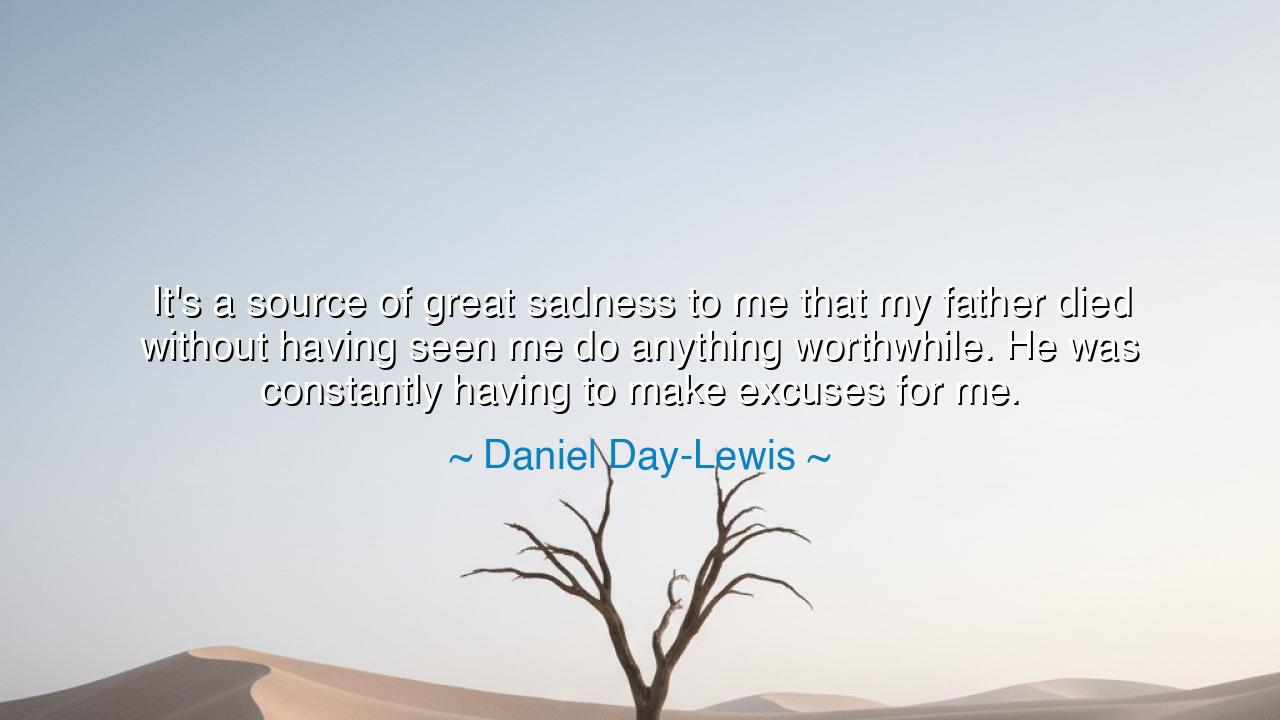
It's a source of great sadness to me that my father died without
It's a source of great sadness to me that my father died without having seen me do anything worthwhile. He was constantly having to make excuses for me.






In the deeply human words of Daniel Day-Lewis, there resounds a sorrow that echoes through generations: “It’s a source of great sadness to me that my father died without having seen me do anything worthwhile. He was constantly having to make excuses for me.” Beneath these simple words lies a truth as ancient as time itself—the yearning for a parent’s recognition, the ache of unfinished approval, and the bittersweet burden of legacy. This confession is not merely about fame or success, but about the sacred bond between father and son, and the haunting question that lives in many hearts: Did those who raised me know what I could become before they were gone?
Daniel Day-Lewis, one of the most celebrated actors of the modern age, was the son of Cecil Day-Lewis, a renowned poet and Britain’s Poet Laureate. The father’s life was steeped in words and literature; the son’s, in silence and transformation. Yet when Daniel was young, restless, and uncertain, his father passed away before he could see the brilliance that would later define his son’s career. Thus, these words are not born from vanity, but from remorse—from the sorrow of unrealized connection, from the wish that love could have been affirmed through accomplishment, that the son might have proven himself before time drew its curtain closed.
In these words, we find an ancient theme: the desire to be seen by those who shaped us. Even the heroes of old longed for their parents’ approval. Consider the story of Alexander the Great, whose ambition burned brighter than any star in his age. Much of his conquest was driven by the shadow of his father, King Philip II of Macedon, a man of immense achievement and relentless authority. It is said that when Alexander stood before the conquered city of Gordium, he whispered, “Now my father shall see that I am worthy.” But by then, Philip was already gone, and Alexander’s victories could only echo across the silence of death. Like Day-Lewis, he achieved greatness too late to share it with the one whose acknowledgment he craved most.
The sadness Daniel speaks of is not weakness—it is the grief of a soul that understands the impermanence of time. How often do we delay the showing of our gifts, believing there will always be another day to make our parents proud, another chance to say, “Look, I have become something after all”? But life, in its merciless wisdom, does not always grant such moments. The ones we love may depart before our triumphs unfold. And in that absence, success itself feels hollow, for its truest joy—the joy of sharing it—is gone.
Yet there is also humility in his words. He does not blame fate, nor does he glorify himself. He admits that his father had to “make excuses” for him, a confession heavy with self-reflection. It speaks to the restlessness of youth, to the times we cause pain to those who believe in us. The ancients taught that regret is the soul’s most honest teacher, for it turns pride into reverence and foolishness into wisdom. Daniel’s sadness becomes a mirror through which we see our own unfinished reconciliations, our own unspoken apologies to those who loved us when we gave them little reason to.
From his sorrow, we learn a timeless lesson: do not wait to honor those who have loved you. Speak your gratitude while they yet breathe. Share your dreams, even if they are uncertain. Let your parents, your mentors, your friends see the seeds of your becoming before they are gone. For the day will come when you stand before your own reflection, successful perhaps, but longing for one more moment of understanding, one more nod of approval that can no longer be given.
So, O listener, take heed of this wisdom from Daniel Day-Lewis, spoken through grief and maturity: greatness is not only in what we achieve, but in the love we return. If your parents live, show them your heart now—your effort, your courage, your growth. And if they have passed, honor them not with sorrow, but with excellence born of remembrance. For even unseen, they watch from the silence beyond time. And when you act with integrity, when you create something true, their unseen gaze becomes your strength, their unseen love your guide. In this way, sorrow becomes legacy, and regret is transmuted into purpose.






AAdministratorAdministrator
Welcome, honored guests. Please leave a comment, we will respond soon